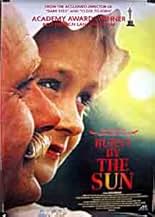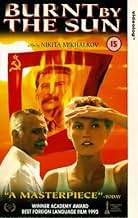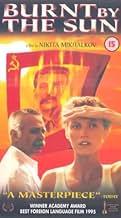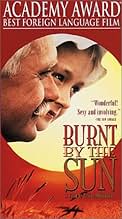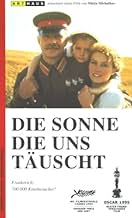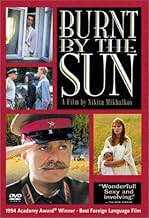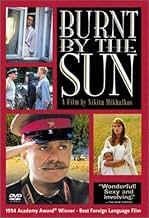IMDb-BEWERTUNG
7,8/10
16.852
IHRE BEWERTUNG
Füge eine Handlung in deiner Sprache hinzuIn the USSR in 1936, shadows of Stalin's repressions fall on a famous, revolutionary hero. The accusations of him being a foreign spy are nonsense, and everyone knows that. However, a slow p... Alles lesenIn the USSR in 1936, shadows of Stalin's repressions fall on a famous, revolutionary hero. The accusations of him being a foreign spy are nonsense, and everyone knows that. However, a slow process of his downfall has already started.In the USSR in 1936, shadows of Stalin's repressions fall on a famous, revolutionary hero. The accusations of him being a foreign spy are nonsense, and everyone knows that. However, a slow process of his downfall has already started.
- 1 Oscar gewonnen
- 4 Gewinne & 9 Nominierungen insgesamt
Ingeborga Dapkunaite
- Marusya
- (as Ingeborga Dapkunayte)
Nadezhda Mikhalkova
- Nadya
- (as Nadya Mikhalkova)
André Oumansky
- Filipp
- (as Andre Umanskiy)
Empfohlene Bewertungen
Having read all of the negative commentaries on this film, I would first like to point out that severely criticising the period of Soviet history in which Utoml'ennye Solntsem takes place, and in that effort, condemning the people of that era such as are portrayed in this film as being entirely culpable for their actions, is all very well and good to do from hindsight, and from the safety of a soft computer chair in the modern-day West. Because of course, no one is tortured today in the West for a casual remark against the reigning despot; nor do we live under the threat that our families may be sent off to Siberia as one of the consequences of our actions, great or trivial. I myself can't say what I would have been willing to do under the circumstances that existed during the time of the Soviet purges, whom I would have betrayed just to survive, or if I would have the courage to make some kind of moral, social, or political stand, and if I think I could have? Well,if we all admit it to ourselves, we know that torture will break any man eventually... In watching this film, I think that we should keep in mind that we are not necessarily here to judge but to take the director's journey to another time and place: and yet we should still be able to remember and respect the fact that what we are seeing here is a piece of the history that lies beneath the modern day Russia. This history is a shadow that has cast its pall over the lives of every Soviet citizen since then, including Mikhalkov. The fear of the purges that swept over the Soviet Union during the 1930's and 40's is a kind of fear that will fade, but never die away entirely. So, what can be the point in overly criticising Mikhalkov or any one in the former USSR for surviving under the system as it was before glasnost, knowing what they knew of the state and the full extent of what it could do and had already done (Stalin's purges may even have claimed 20-40 million lives)? If Utoml'ennye Solntsem is Mikhalkov's attempt to exonerate his "cooperation" with the Soviet system within his own time, what has he really got to vindicate or to feel guilty about? That being said, and despite the fact that numerous films, books, and media have copiously used this subject to tell a story, it is not a subject which can be exhausted but a rich treasure of unusual human experiences. And, as some have pointed out, this film is far more than just a story of revolutionary politics or a tale of betrayal: it IS a love story, between men and women, and between men and their motherland. Moreover, I was sincerely moved by the love triangle between Marussya, Mitya, and Kotov. Utoml'ennye Solntsem is not, however, a film that will make you laugh often, and would not at all were it not for the undeniable charm of the bold little Nadya. Utoml'ennye Solntsem will make those who appreciate the tragic element within history, and in particular, this era of political turmoil, shed more than a few tears. Because the truth lingers behind this tale, the truth of a time which was a nightmare few of us can imagine... or would want to. In my opinion, the great thing about this film is that it throws us back for a while into that era and portrays what was good about it, what remains good, despite all obstacles; the film is a tale of love that survives the most extreme of human conditions. It is fascinating and compelling, brave and tender, horrifying, and real. Not for everyone, but certainly a masterpiece within its genre.
This movie is about the most desperate and tragic situation in the human life. This is when our life is determined by external forces. Even the most basic form of happiness - being with you family, enjoying your child - were impossible in the Russia of Stalin.
Sometimes I think about people who were borne 20 years before World War II in Germany, Poland or Russia. I wonder whether they had a feeling that the life was extremely unfair to them. The feeling that your fate was determined by the time you were borne in, and that you couldn't do anything at all to somehow change it. If Mitya, Kotov and Marusya would not die then, they would have to wait for 50 years to be able to truly understand what happened to them and who was to blame for it.
I was puzzled why Mitya picked up the phone and agreed to arrest Kotov. Why didn't he stop his suffering immediately, as he knew that he had no other option than ruining lives of the people he loved. Was it his hatred towards Kotov and the opportunity to take revenge for being expelled for 10 years? Was it the last hope that his love to Marusya would reverse her marriage?
After watched the film again & again I decided that he knew from the offset there was no way out. Mitya went to his old home because he wanted just one thing - to say farewell to his dream that the old times would ever return. The dream that made him betray his comrades in the 20th, and come back from France in the 30th.
I'm so happy that we live in freedom and that the iron curtain fell.
Sometimes I think about people who were borne 20 years before World War II in Germany, Poland or Russia. I wonder whether they had a feeling that the life was extremely unfair to them. The feeling that your fate was determined by the time you were borne in, and that you couldn't do anything at all to somehow change it. If Mitya, Kotov and Marusya would not die then, they would have to wait for 50 years to be able to truly understand what happened to them and who was to blame for it.
I was puzzled why Mitya picked up the phone and agreed to arrest Kotov. Why didn't he stop his suffering immediately, as he knew that he had no other option than ruining lives of the people he loved. Was it his hatred towards Kotov and the opportunity to take revenge for being expelled for 10 years? Was it the last hope that his love to Marusya would reverse her marriage?
After watched the film again & again I decided that he knew from the offset there was no way out. Mitya went to his old home because he wanted just one thing - to say farewell to his dream that the old times would ever return. The dream that made him betray his comrades in the 20th, and come back from France in the 30th.
I'm so happy that we live in freedom and that the iron curtain fell.
You know, here, in Moscow, the critics do their best to show that Nikita Mikhalkov makes popular pictures which aren't to be considered serious. To hear that "The Barber of Siberia" is a stupid sentimental movie is quite common nowadays.
But the more time passes from his next in turn production, the more a "strange" effect seems to take place: his films at last are rated according to their true value and not to somebody's opinion about them. It is always hard to say that something new is really good, but some time later...
"Utoml'ennye Solntsem" is not a very emotional movie. I don't suppose you'd cry when watching it. But my opinion is that it's a brilliant one. It is historically authentic (I've studied that period of time quite carefully so I think I have a right to say so). And no-one on this site seems to notice the love story in the film, which actually brought about the whole tragedy (remember, Kotov made Mitya work for NKVD). It was marvellously played by Oleg Men'shikov (my favourite actor) and Ingeborga Dapkunaite, a remarkable Lithuanian actress. And Mikhalkov himself, of course - "Kot" means "cat", by the way. Many people endow him with the characteristics of Kotov which only shows that he played his role well. A good actor is always attributed his character's traits.
But still, for me the main feature of the film is the world of Mitya's soul created by Men'shikov. A young, talented boy with brilliant prospects is what Mitya was. He gets involved in the war, goes through many ordeals, then comes home and falls in love with the girl he knew from her very birth, Marousya. But their happiness is too short. He is given a choice: to work for NKVD or...to commit suicide. He's only 24, and he wants to live. But hope for future slowly disappears as life goes on, cruel and senseless. When Mitya appears on the dacha of Marousya's parents, his soul is almost a wreck. But the last chance is killed when he sees that, after a suicide attempt, after months of despair, Marousya has married Kotov and doesn't want to go through everything again. Therefore Mitya begins to fulfill his revenge.
But the more time passes from his next in turn production, the more a "strange" effect seems to take place: his films at last are rated according to their true value and not to somebody's opinion about them. It is always hard to say that something new is really good, but some time later...
"Utoml'ennye Solntsem" is not a very emotional movie. I don't suppose you'd cry when watching it. But my opinion is that it's a brilliant one. It is historically authentic (I've studied that period of time quite carefully so I think I have a right to say so). And no-one on this site seems to notice the love story in the film, which actually brought about the whole tragedy (remember, Kotov made Mitya work for NKVD). It was marvellously played by Oleg Men'shikov (my favourite actor) and Ingeborga Dapkunaite, a remarkable Lithuanian actress. And Mikhalkov himself, of course - "Kot" means "cat", by the way. Many people endow him with the characteristics of Kotov which only shows that he played his role well. A good actor is always attributed his character's traits.
But still, for me the main feature of the film is the world of Mitya's soul created by Men'shikov. A young, talented boy with brilliant prospects is what Mitya was. He gets involved in the war, goes through many ordeals, then comes home and falls in love with the girl he knew from her very birth, Marousya. But their happiness is too short. He is given a choice: to work for NKVD or...to commit suicide. He's only 24, and he wants to live. But hope for future slowly disappears as life goes on, cruel and senseless. When Mitya appears on the dacha of Marousya's parents, his soul is almost a wreck. But the last chance is killed when he sees that, after a suicide attempt, after months of despair, Marousya has married Kotov and doesn't want to go through everything again. Therefore Mitya begins to fulfill his revenge.
This is an interestingly broken-backed film. Set during the Stalinist era during one idyllic summer, it begins by contrasting the lives of Dmitriy (Oleg Menshikov) and Sergey (Nikita Mikhailkov) - the one a dilettante musician and pianist, the other a colonel in the Russian army and favorite of the premier. They both have a claim on Marusya (Ingeborg Dapkunaite): Srgey is married to her, and Dmitriy was a former lover of hers. It seems that the film's moral scheme is relatively straightforward: Dmitriy is talented but feckless, while Sergey seems virtually untouchable - not only does he have a great career, but he is happily married as well. However director Mikhailkov turns the tables on our expectations and thereby transforms BURNT BY THE SUN into a penetrating analysis of how dictatorships corrupt everyone around them. Concepts of 'good' and 'evil# no longer prevail: everyone simply does what it takes in order to survive. The ending is both shocking yet predictable. Visually speaking, the film contrasts the idyllic surroundings of Dmitriy's dacha with the behavior of the protagonists - it seems that no one can actively enjoy the delights of glorious summer weather, for fear of being discovered. Life at that time must have been precarious, with no one actually being sure as to what would happen to them next. BURNT BY THE SUN is slow-moving, but Mikhailkov's camera has an eye for telling detail and significant gestures. Definitely worth watching.
10Ed-90
Beautiful film, full of humanity and honest in ways sometimes jarring, but always right on target. A westerner gets a sense of the depth of love for mother Russia, as well as the difficulty many faced during the 1930's Stalinist years. The film is a winner, and worth seeing more than once. The performance by the little girl is incredible; I was taken by her talent and smarts. One of the best films I've seen this year. Thumbs up. Two thumbs up.
Wusstest du schon
- WissenswertesOne of four Russian films ever to win Academy Award for Best Foreign Language Film. The others are Krieg und Frieden (1965), Uzala, der Kirgise (1975) and Moskau glaubt den Tränen nicht (1980)
- VerbindungenFeatured in Namedni 1961-2003: Nasha Era: Namedni 1995 (1999)
- SoundtracksUtomlennoe solntse
Written by Jerzy Petersburski (as Ezhi Petersburgskiy)
Lyrics by Iosif Alvek (uncredited)
Performed by Mark Simkin (singer), Efim Vyshkin (violin), Aleksandr Bashkatov (bayan), and Viktor Agapov (guitar)
Played by an instrumental quartet during opening credits as a film's theme song
Top-Auswahl
Melde dich zum Bewerten an und greife auf die Watchlist für personalisierte Empfehlungen zu.
- How long is Burnt by the Sun?Powered by Alexa
Details
- Erscheinungsdatum
- Herkunftsländer
- Offizieller Standort
- Sprachen
- Auch bekannt als
- Burnt by the Sun
- Drehorte
- Produktionsfirmen
- Weitere beteiligte Unternehmen bei IMDbPro anzeigen
Box Office
- Budget
- 2.800.000 $ (geschätzt)
- Bruttoertrag in den USA und Kanada
- 2.302.338 $
- Eröffnungswochenende in den USA und in Kanada
- 60.074 $
- 23. Apr. 1995
- Weltweiter Bruttoertrag
- 2.313.461 $
- Laufzeit2 Stunden 15 Minuten
- Farbe
- Sound-Mix
- Seitenverhältnis
- 1.66 : 1
Zu dieser Seite beitragen
Bearbeitung vorschlagen oder fehlenden Inhalt hinzufügen

Oberste Lücke
By what name was Die Sonne, die uns täuscht (1994) officially released in India in English?
Antwort

